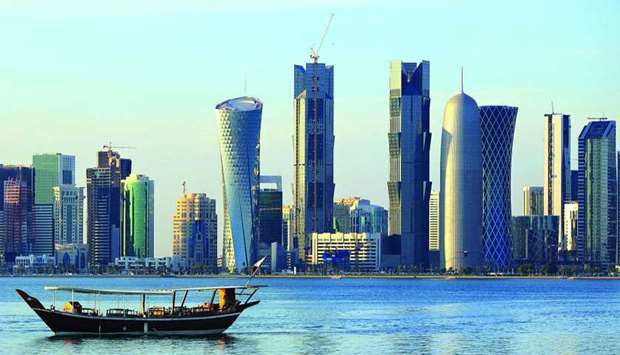Qatar’s public debt is receding and expected to come down to 55.6% of the country’s gross domestic product (GDP) by 2020, a new report has shown.
This year the country’s public debt will be 56.2% of the GDP and 56.3% next year, FocusEconomics has said in a report.
The economy “demonstrated strong resilience” in the final quarter of 2017 despite the ongoing economic blockade, with output expanding 1.8% in annual terms, just shy of the third quarter’s 1.9% rise, FocusEconomics said.
The fourth-quarter print “reflected a solid performance” from the non-hydrocarbon sector, particularly in construction-related activity, which more than offset a drop in production in extractive industries.
Moreover, the recently-released data suggests that momentum has been carried over into early 2018: industrial production continued to improve in annual terms in January while exports increased markedly in February on the back of higher hydrocarbon shipments, leading the trade surplus to expand at a rate of over 20% year-on-year.
“In addition, Qatar’s banking system remains in good shape, reflected in healthy capitalisation levels, stable private sector credit growth and the gradual return of non-resident deposits,” FocusEconomics said.
Qatar’s GDP is expected to total QR791bn by 2022 from QR641bn by end-2018, FocusEconomics said.
Next year, the GDP may exceed QR676bn, QR712bn in 2020 and QR750bn in 2021.
GDP per capita (in dollar terms) will exceed $77,121 in 2022 from $63,447 this year. Next year, it will be $66,033, $69,380 (2020) and $73,125 in 2021.
FocusEconomics said Qatar’s inflation inched down to 0.8% in February from 0.9% in January. Its economists see inflation at 2.2% in 2018 and 2.6% in 2019.
“Rising oil prices and the government’s infrastructure investment push in preparation for the 2022 World Cup should prompt growth to accelerate this year. Nevertheless, the embargo will continue to weigh on the outlook,” FocusEconomics said.
The researcher forecasts Qatar’s growth of 2.9% in 2018, unchanged from last month’s projection, and 2.7% in 2019.
On Qatar’s strengths, FocusEconomics said the country is a “net creditor due to large stock of foreign assets. Qatar also holds the world’s third largest gas reserves.”
Currently, the country has very high sovereign ratings. Moody’s has rated Qatar Aa3, while S&P Global Ratings and Fitch Ratings have given Qatar ‘AA-'.


